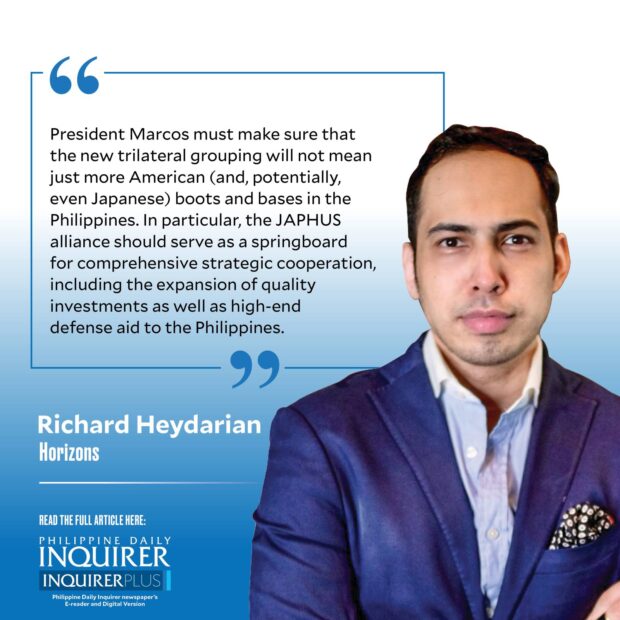JAPHUS: A Japan-Philippine-US Alliance?

Nowadays, it’s a fad to brandish patriotic credentials via strong posturing on the West Philippine Sea disputes. Countless government officials compete to criticize China’s latest bullying acts in our waters. This is in stark contrast to the six years of the Rodrigo Duterte presidency when we had to endure either defeatist rhetoric by no less than the commander in chief and/or sift through the myriad of contradictory statements by top Cabinet members.
But now, even senior allies of the former president have joined the patriotic chorus. Think of Sen. Ronald dela Rosa, who couldn’t resist trolling the Chinese national team with his couture West Philippine Sea shirt during last year’s Fiba World Cup tournament. Just weeks earlier, his colleague and fellow Duterte loyalist, Sen. Christopher Go, expressed his “deepest resentment and condemnation” of China’s bullying of Philippine coast guard vessels in the West Philippine Sea.
Even more interesting is the case of Duterte’s former political adviser and reelectionist Sen. Francis Tolentino, who has gone so far as to take credit for the gradual crystallization of quadrilateral cooperation among the Philippines, Australia, the US, and China.
Article continues after this advertisement“Last year February 2023, modesty aside, I suggested the ‘quad’ with USA, Australia, and Japan—finally the joint maritime patrol will happen today, April 7, 2024!” Tolentino claimed in a recent social media post.
The problem, however, is that well before he began speaking tough on the West Philippine Sea issue, countless experts have been raising this issue in major capitals and influential policy circles for the past decade. The main reason the “Quad” didn’t come to fruition earlier is Tolentino’s former boss, Duterte, who actively sabotaged our traditional alliances to please his patrons in Zhongnanhai.
Thanks to President Marcos’ sound approach to the West Philippine Sea disputes, all sorts of long-delayed initiatives are taking off with vengeance. The recently concluded quadrilateral patrols with our three key allies are likely just the beginning of a new era of Philippine foreign policy.
Article continues after this advertisementThis week, Mr. Marcos will return to the White House for a historic trilateral summit with US President Joseph Biden and Japanese Prime Minister Fumio Kishida. The aim is to create a new security grouping in the mold of the Australia-UK-US (AUKUS) and US-Japan-South Korea trilateral groupings.
With multilateral organizations, namely the Association of Southeast Asian Nations, refusing to call out China’s hegemonic ambitions, the US is leveraging its large network of partners through “minilateralism”—ad-hoc, flexible, and issue-specific cooperation with like-minded powers.
For Tokyo, the emerging Japan-Philippine-US (JAPHUS) trilateral grouping is also a major step in solidifying its emergence as a key security provider in the Indo-Pacific region. Shortly after the JAPHUS trilateral meeting this week, Mr. Marcos and Kishida are expected to sign a Visiting Forces Agreement-style pact that could transform regional affairs for the foreseeable future.
There are, however, reasons to curb our geopolitical enthusiasm. Mr. Marcos must make sure that the new trilateral grouping will not mean just more American (and, potentially, even Japanese) boots and bases in the Philippines. In particular, the JAPHUS alliance should serve as a springboard for comprehensive strategic cooperation, including the expansion of quality investments as well as high-end defense aid to the Philippines.
It’s quite astonishing that communist Vietnam, a former US enemy, has a trade surplus with the US that is 10 times our total exports to our sole treaty ally. The current levels of American economic footprint in the Philippines are, frankly, pathetic compared to their investments in neighboring countries, most of which are increasingly more aligned to and/or dependent on China. And will the US offer a bilateral free trade deal to the Philippines, as the Japanese did almost 20 years ago? Not to mention, when will the Philippines finally receive modern fighter jets and warships from either the US or Japan?
Moreover, tighter security cooperation with our traditional allies should not limit our room for maneuver. We should avoid getting locked into a permanent anti-China alliance, but instead leverage our security partnerships for our national interest. In particular, we should make sure that we won’t get involved in any US-led contingency plan over Taiwan absent proper assessment of the big picture of what is best for the Philippines’ long-term security. We should guard against overcorrecting Duterte’s follies, too.
rheydarian@inquirer.com.ph
















